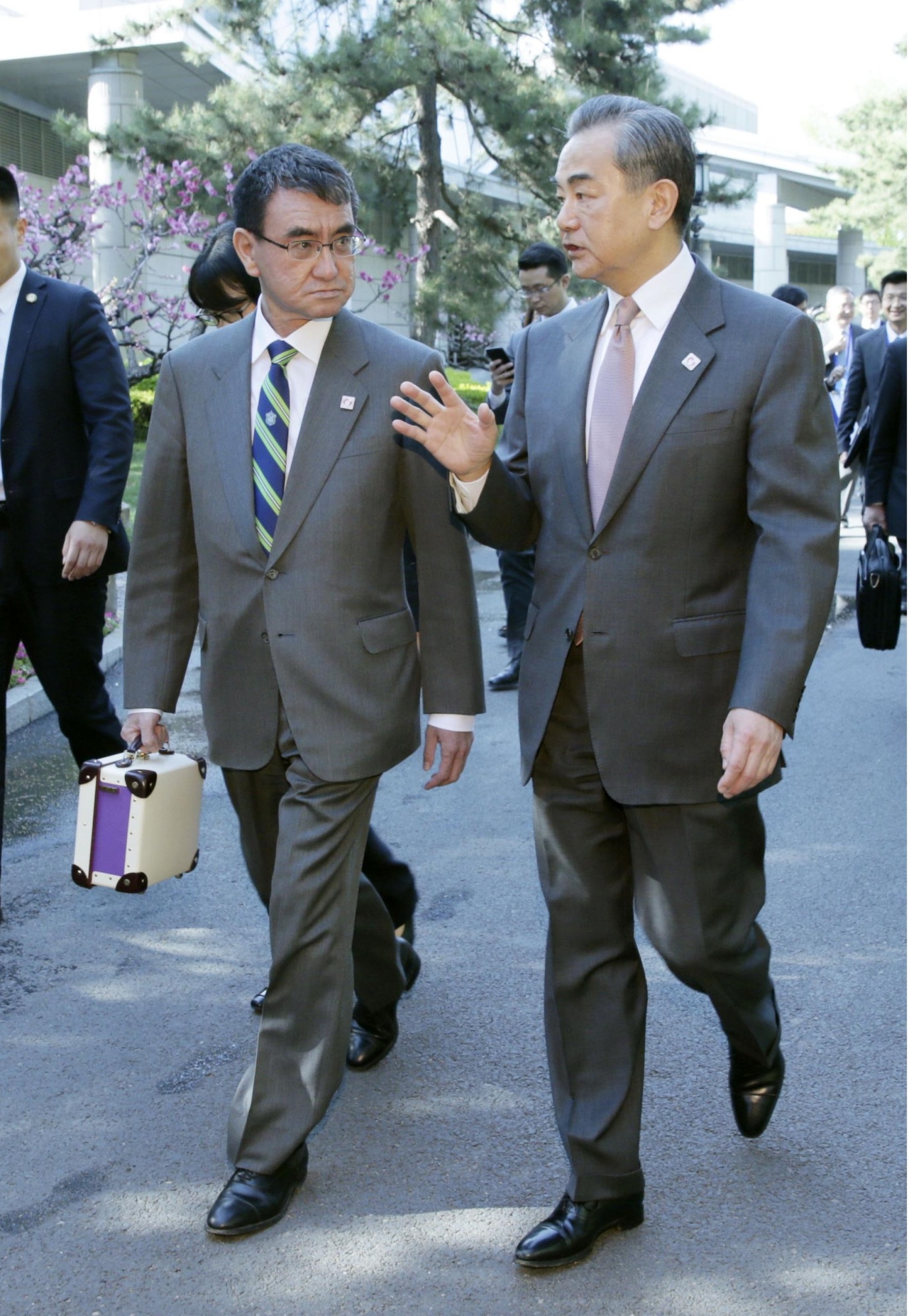
Japanese, Chinese ministers discuss key issues at Beijing economic dialogue meeting
BEIJING - Amid a dimming global growth outlook, Japan and China on Sunday held an expanded ministerial meeting focusing on key economic issues ranging from trade and investment to better protection of intellectual property rights.
The so-called high-level economic dialogue, co-chaired by Foreign Minister Taro Kono and his Chinese counterpart, Wang Yi, took place in Beijing at a time when the Asian powers are seeking to boost cooperation following years of political tensions.
“Economic cooperation between China and Japan is continuously progressing and having a profound impact on the world,” Wang, who is also a state councilor, said at the outset of the meeting. “We should exchange wisdom for the peaceful and stable development of the region and the world.”
Kono, who is leading a delegation comprising five other ministers, said, “It goes without saying it’s important that the second- and third-largest economies in the world hold constructive discussions on economic ties.”
The dialogue, the first to be held in China since 2010, comes about two months before Chinese President Xi Jinping’s possible visit when Japan hosts this year’s summit of the Group of 20 major economies in Osaka.
If
realized it will be Xi’s first visit to the country since coming to power in
2013.
About 10 ministers from both countries sitting together will search for ways to create a more favorable environment for companies doing business in each other’s country amid worries about an economic slowdown, triggered in part by the ongoing trade war between China and the United States.
The trade conflict prompted the International Monetary Fund to say Tuesday that global growth is projected to decline further to 3.3 percent in 2019, down from the 3.5 percent it estimated in January.
Japan
plans to call on China to crack down on intellectual property theft and forced
technology transfers, which Chinese companies have long been accused of by
foreign competitors, Japanese officials said.
Intellectual property theft was one of U.S. President Donald Trump’s reasons for imposing tariffs on imports from China.
Japan
is also expected to ask China to lift restrictions on imports of Japanese food,
introduced after the 2011 Fukushima nuclear disaster due to concerns over
radioactive contamination.
In a blow
to Japan’s fishing industry, the World Trade Organization ruled Thursday that
South Korea could maintain its import ban on some kinds of Japanese seafood,
reversing an earlier decision that called for the prohibition to be lifted.
Meanwhile,
China may ask Japan to invest in infrastructure projects under Xi’s “One Belt,
One Road” development initiative stretching across Asia, the Middle East,
Europe and Africa.
China
could also push Japan to reconsider its decision to exclude telecommunications
equipment makers Huawei Technologies Co. and ZTE Corp. from government
procurement contracts, amid concerns among some developed countries over
security breaches.
Trade
is also likely to be on the agenda, as economic growth in China slows amid the
tariff war with the United States, and with Japan slated to begin trade
negotiations in Washington over the next several days, according to the
officials.
Japan
and China have held the economic dialogue since 2007, though there was an
eight-year hiatus as relations sank to a low due to a dispute over the
Japan-controlled Senkaku Islands and wartime issues.
Japan
placed the uninhabited islets in the East China Sea under state control in
2012, drawing the ire of China which claims sovereignty over them and calls
them Diaoyu. With relations having since improved, the dialogue restarted with
the fourth round last April in Tokyo.
For the
fifth round, Japan is fielding a larger delegation, featuring six members of
Prime Minister Shinzo Abe’s Cabinet.
Besides
Kono, they are industry minister Hiroshige Seko, farm minister Takamori
Yoshikawa, transport minister Keiichi Ishii, Environment Minister Yoshiaki
Harada and regulatory reform minister Satsuki Katayama.
The
Chinese team includes Commerce Minister Zhong Shan and Miao Wei, minister of
industry and information technology.
Kono is
scheduled to hold separate meetings with Premier Li Keqiang and Wang on Monday.
Source: https://www.japantimes.co.jp/news/2019/04/14/business/japanese-chinese-ministers-discuss-key-issues-beijing-economic-dialogue-meeting/
 English
English Japan
Japan
